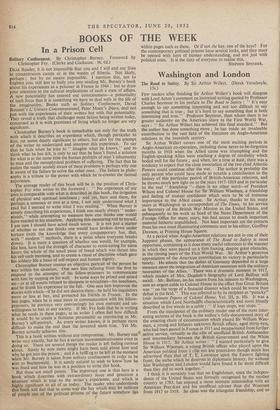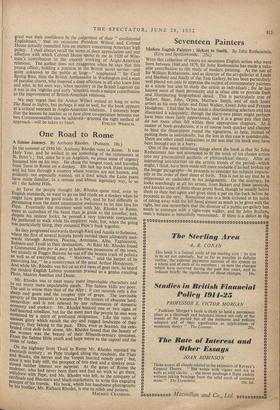Washington and London
FEW readers after finishing Sir Arthur Willert's book will disagree with Lord Acton's comment on historical writing quoted by Professor Charles Seymour in his preface to The Road to Safety : " It's easy enough to say something interesting and not too difficult to say something that is true ; but it's hard to say something that is both interesting and true." Professor Seymour, than whom there is no greater authority on the American share in the First World War, says : " Sir Arthur Willert has achieved this final standard." But the author has done something more ' . he has made an invaluable contribution to the vast field of the literature on Anglo-American relations in the twentieth century.
Sir Arthur Willert covers one of the most exciting periods in Anglo-American co-operation, including those never-to-be-forgotten months in 1918 when the Allied cause was triumphing and the English-speaking Allies were reaching a degree of cordiality which boded well for the future ; and when, for a time at least, there was a tendency to expect that the close association of the two chief Atlantic Powers could continue after the war. The author is probably the only person who could have made so notable a contribution to the history of this particular period of British-American relations, and he throws much new light on to the years 1917-1919 and in particular to the real " friendship "—there is no other word—of President Wilson and Colonel House for Sir William Wiseman, a friendship and feeling of mutual confidence which were to be of immense importance to, the Allied cause. Sir Arthur, thanks to his many years at Washington as correspondent .of The Times, to his service as Secretary of the British War Mission in the United States, and subsequently to his work as head of the News Department of the Foreign Office for many years, has had access to much important material hitherto unpublished. Not least important are the extracts from his own most illuminating comments sent to his editor, Geoffrey Dawson, at Printing House Square.
At a period when Anglo-American relations are not in one of their happiest phases, the appearance of The Road to Safety is most opportune, containing as it does many useful references to the manner in which they were placed on a firm footing, despite great obstacles, in the closing years of the First World War. Sir Arthur's generous appreciation of the American contribution to victory is particularly timely. He admits that the defeat of Germany depended in a large measure upon the integration of American resources with the military necessities of the Allies. There was a dramatic moment in 1917, which readers of Mrs. Dugdale's biography of Lord Balfour will recall. Mr. Balfour, on his return from his mission to Washington, sent an urgent cable to Colonel House to the effect that Great Britain was " on the verge of a financial disaster which could be worse than defeat in the field." This was referred to by its recipient as "panicky" (vide Intimate Papers of Colonel House, Vol. III, p. 10). It was a situation which Lord Northcliffe characteristically and more bluntly described in five Words in a cable : '' If loan stops, war stops."
From the standpoint of the ordinary reader one of the most inter- esting sections of the book is the author's fully-documented story of the amazing chain of circumstances which placed Sir William Wise- man, a young and hitherto unknown British officer, aged thirty-two, who had been gassed in France in 1915 and incapacitated from further active service, virtually in the role of unofficial British Ambassador and intermediary between the British Government and the White House in 1917. Sir Arthur writes : " 1 wanted particularly to give Sir William Wiseman, a young British officer who played upon the American political front a role not less precocious though much less advertised than that of T. E. Lawrence upon the Eastern fighting front, the niche which he deserves in diplomatic history, for without him Washington and,LOndon would have found it far more difficult than they did to work together."
I think it is certainly. true that no Englishman, since the indepen- dence of the United States was formally recognised by the mother country in 1783, has enjoyed a more intimate relationship with an American Pres:dent and his unofficial adviser than did Wiseman from 1917 to 1919. So close was the triangular friendship, and so
great was their confidence In the judgement of their " confidential Englishman," that on occasions President Wilson and Colonel House actually consulted him on matters concerning American high policy. I shall always recall the terms of deep appreciation and real affection with which Colonel House -spoke to me in 1920 of Wise- man's contribution to the smooth working of Anglo-American relations. The author does not exaggerate when he says that this young officer, holding a position in the British secret service—and quite unknown to the public at large—" supplanted " Sir Cecil Spring Rice, then the British Ambassador in Washington and a man of peculiar charm, who inspired a deep affection in all who knew him and who, in his own way, when secretary in the British Legation (as it was in the 'eighties and early 'nineties), made a unique contribution to the improvement of British-American relations.
We may regret that Sir Arthur Willert waited so long to write The Road to Safety', but perhaps it was as well, for the book appears at a critical moment in Anglo-American relations. I sincerely hope that the lessons he teaches as to how close co-operation between our two Commonwealths can be achieved—granted the right method of



















































 Previous page
Previous page